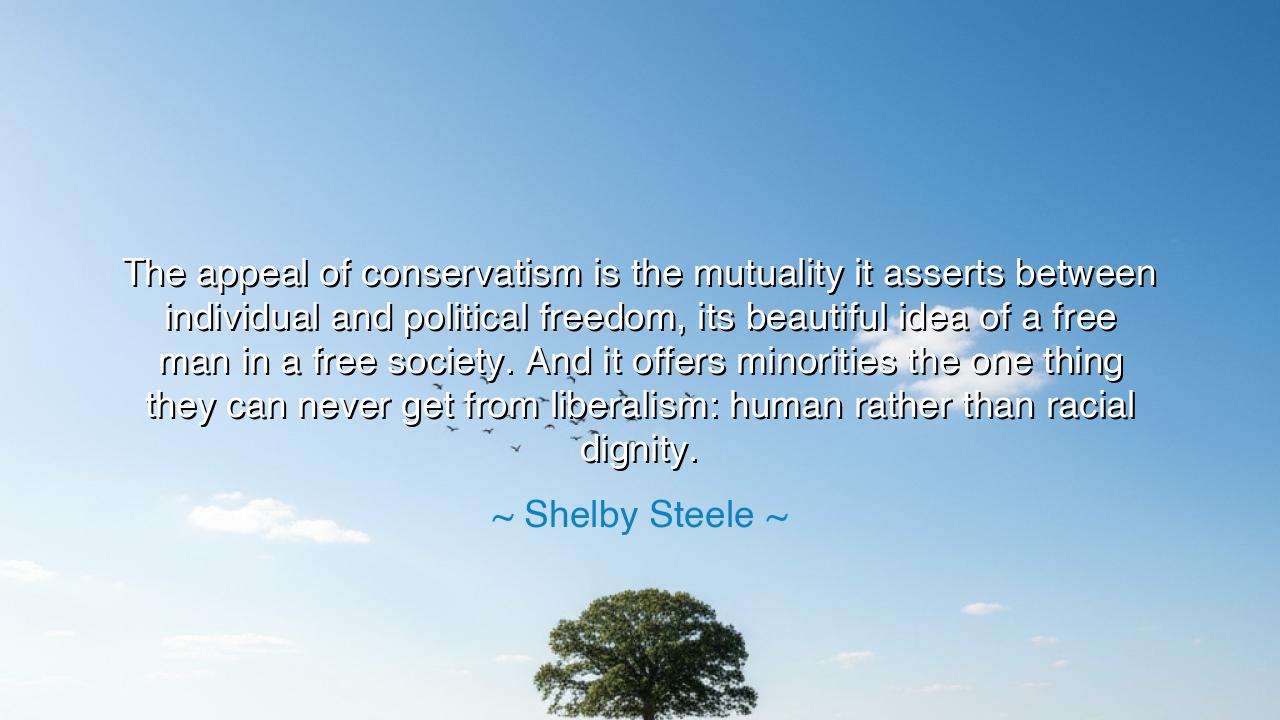
The appeal of conservatism is the mutuality it asserts between
The appeal of conservatism is the mutuality it asserts between individual and political freedom, its beautiful idea of a free man in a free society. And it offers minorities the one thing they can never get from liberalism: human rather than racial dignity.






Shelby Steele, the thinker who gazed deeply into the struggles of race, freedom, and identity in America, once declared: “The appeal of conservatism is the mutuality it asserts between individual and political freedom, its beautiful idea of a free man in a free society. And it offers minorities the one thing they can never get from liberalism: human rather than racial dignity.” These words are not mere argument, but a meditation on the longing of the human soul to be seen not as category or label, but as whole and sovereign being.
The meaning here is profound. Steele sees conservatism not simply as a political stance, but as an appeal to unity between the inner self and the outer order—a harmony between the individual’s liberty and the structures of society that protect it. In his view, freedom is not a gift granted by rulers nor a privilege dispensed by parties, but the natural state of a person when both heart and nation respect his sovereignty. This, he calls “the beautiful idea of a free man in a free society,” a vision that transcends race, class, and station.
But Steele goes further: he warns that liberalism, in its attempt to uplift minorities, often binds them instead to identities defined by race, grievance, or dependence. In seeking to give them justice, it too often robs them of the deeper treasure—human dignity unqualified by labels. Conservatism, by contrast, at least in Steele’s telling, invites minorities to step into the universal arena of humanity, to be measured not by skin but by soul, not by collective grievance but by personal worth. Thus, dignity is restored not as something bestowed, but as something recognized—eternal, unchanging, indivisible.
History provides examples of this tension. Consider Frederick Douglass, once a slave, who rose by his own fierce determination into the role of orator, statesman, and conscience of his nation. Though he fought against slavery and demanded justice, he also rejected any notion that his worth came from his race alone. His cry was always: I am a man. He sought not racial dignity but human dignity, to be seen as an equal among equals in a free society. In Douglass, we see the very vision Steele describes: freedom that flows not from category, but from universal human worth.
We might also remember the life of Václav Havel, dissident in communist Czechoslovakia. Under a system that claimed to protect the collective, individuals were erased, silenced, made tools of ideology. Havel resisted by clinging to truth, to personal responsibility, to human dignity that no system could erase. His triumph, and the triumph of his people, came not from racial or group recognition, but from the restoration of the free man in a free society. His story reminds us that when political systems emphasize identity over universality, dignity suffers; but when they honor the individual as sovereign, freedom flourishes.
Steele’s words also carry a challenge for us today. They urge us to look beyond the comforts of identity politics or partisan labels and to ask instead: what restores the mutuality of freedom? What enables each person—minority or majority, strong or weak—to stand upright in both personal liberty and political protection? The answer, he suggests, lies in a vision where race is not the measure of worth, and where society values each man and woman first as human.
The lesson, then, is timeless: seek always the deeper dignity. Do not settle for recognition based on race, wealth, or status, for these are passing and fragile. Claim instead the dignity that comes from being fully human, and fight to create systems that honor that truth. Practically, this means defending both the rights of the individual and the freedoms of the society, ensuring that neither crushes the other. It means lifting others not by assigning them categories, but by affirming their humanity, their capacity, their worth.
So let Steele’s words echo like a call to higher ground: “The appeal of conservatism is… a free man in a free society. And it offers minorities… human rather than racial dignity.” Whether one agrees with his politics or not, the wisdom remains: the truest freedom, the most enduring justice, and the noblest dignity are found not in the narrow walls of identity, but in the universal realm of our shared humanity. And it is there, in that sacred ground, that both man and society will stand most free.






AAdministratorAdministrator
Welcome, honored guests. Please leave a comment, we will respond soon